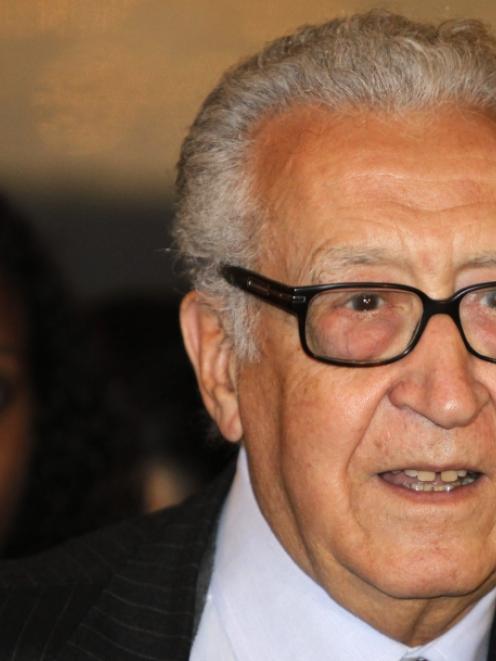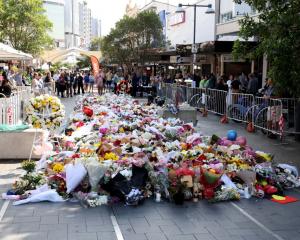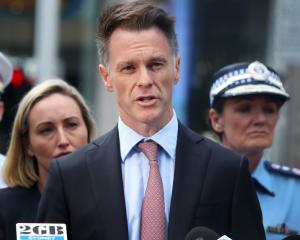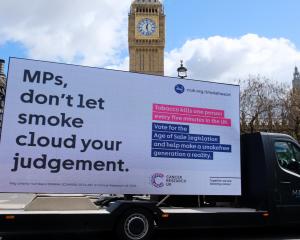
Speaking in Damascus at the end of a five-day trip during which he met President Bashar al-Assad, Lakhdar Brahimi called for a transitional government to rule until elections and said only substantial change would meet demands of ordinary Syrians.
Russian Foreign Minister Sergei Lavrov added to the envoy's call for a peaceful solution when he told a senior Syrian diplomat that only a "broad inter-Syria dialogue and political process" could end the crisis.
Brahimi's push for a transitional government suggested he was trying to build on an international agreement in Geneva six months ago which said a provisional body - which might include members of Assad's government as well as the opposition - should lead the country into a new election.
But the mainly Sunni Muslim Syrian rebels have seized the military initiative since the Geneva meeting in June and the political opposition has ruled out any transitional government in which Assad, from Syria's Alawite minority, plays a role.
Rebel fighters resumed attacks on Thursday (local time) against the military base of Wadi Deif, which lies next to Syria's main north-south highway linking Aleppo with Damascus.
The Syrian Observatory for Human Rights, a British-based opposition group which monitors the violence, said rebels also clashed with Assad's forces inside the Minakh air base in Aleppo province after several days of fighting outside its perimeter, although the army still controlled the base itself.
Around the capital, Assad has used artillery and air strikes for weeks to try to dislodge rebels from suburbs which ring the east and south of the city.
"Certainly it was clear in Geneva, and it's even clearer now that the change which is needed is not cosmetic or superficial," Brahimi told a news conference in Damascus before leaving Syria.
"I believe the Syrian people need, want and aspire to genuine change and everyone knows what this means," he said.
"A government must be created ... with all the powers of the state," Brahimi added. He said it should hold power for a transitional period until elections - either for a new president or a new parliament - are held.
"This transitional process must not lead to the ... collapse of state institutions. All Syrians, and those who support them, must cooperate to preserve those institutions and strengthen them," he said.
Radwan Ziadeh of the opposition Syrian National Council dismissed Brahimi's proposal as "unrealistic and fanciful" and said a transitional government could not be built on the same "security and intelligence structure as the existing regime".
Too soon for a complete plan
Russia's Lavrov met Syrian Deputy Foreign Minister Faisal Makdad in Moscow on Thursday. Interfax news agency quoted Lavrov as saying the chances of forging a solution based on the Geneva agreement were decreasing, but it was necessary to keep seeking a peaceful solution because the alternative is "bloody chaos".
"The longer it continues, the broader its scale and the worse (it will be) for everyone," it quoted Lavrov as saying.
Syrian and Lebanese sources said Makdad had been sent to Moscow to discuss details of a peace plan proposed by Brahimi.
Brahimi is due in Moscow on Saturday and said he also expected to have a third joint meeting with U.S. and Russian officials soon following two rounds of talks earlier this month. But he denied the existence of a U.S.-Russian plan to end the crisis and said it was too soon to present a "complete plan".
"What is preferred is that we don't present such a plan until we feel that all sides have agreed to it. That way, implementing it is easy. If that doesn't happen, the other solution could be to go to the (United Nations) Security Council to issue a binding resolution for everyone," he said.
A Russian Foreign Ministry spokesman also denied any joint initiative between Moscow and Washington.
World powers remain divided over what has become an increasingly sectarian struggle, with Sunni Muslim states such as Turkey and the Gulf Arab countries supporting the rebels while Shi'ite Iran and Hezbollah have backed Assad, whose Alawite community has its roots in Shi'ite Islam.
Syria's struggle "has taken a vicious form of sectarian confrontation", Brahimi said. "Syrian officials foremost, as well as the international community, must not let Syria slide down this very dangerous path which threatens the future of Syria."
Deep differences between Western powers opposed to Assad - led by the United States - and Russia and China which have supported his government, have left the U.N. Security Council paralysed and largely sidelined throughout the conflict.
The political stalemate has helped transform a once-peaceful uprising into a civil war in which rebels have grown in military strength and taken control of swathes of territory in the north, leaving Assad increasingly reliant on air power to curb them.
Activists in the central province of Hama, where rebels launched an offensive last week to extend their control southwards towards the capital, reported on Thursday that rebels shot down a MiG fighter near the town of Morek.
The Syrian Observatory said air force fighters launched three raids on rebel forces around Wadi Deif. The British-based group also reported fierce clashes in the area.
The violence has been accompanied by an escalation in apparently sectarian attacks between the Sunni Muslim majority and minorities such as Assad's Alawite sect, which has largely supported the president.
Activists in Hama uploaded a video of what appeared to be Assad soldiers and shabbiha militia members stabbing the body of a dead man and setting it on fire. The man looked as if he had been beaten to death.
"This is a terrorist, a brother of a whore, one of those trying to destroy the country," one of the men shouted. Two men in camouflage uniforms and army helmets stood by watching. Samer al-Hamawi, an activist from Hama, said rebels in his area found the video on the phone of a soldier they captured this week.
The video emerged a day after Islamist rebel units released footage showing the bodies of dozens of Assad's fighters along a highway near an Alawite town in Hama.












